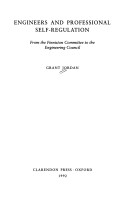This work describes how the Thatcher government sought to reform the engineering profession so that it served the needs of industry more directly. Making use of access to the papers of the Finniston Committee and of various professional institutions, the author gives a description of negotiations that eventually produced a chartered Engineering Council instead of the statutory Engineering Authority initially favoured by the Government. Professor Jordan argues that this outcome can be explained only by an analysis of the dynamics of the Finniston Committee process. He describes how even at a time of so-called strong leadership by Mrs Thatcher, with the party in power suspicious of professional closed shops, the Government was reluctant to act without the co-operation of the various professional and learned societies.
He explains how the engineering institutions, led by Viscount Caldecote, redefined the problems being discussed by Finniston and how Caldecote, who was both a prominent industrialist and a leading figure in the Fellowship of Engineering, persuaded the Government that the key issue was not to mould the engineering profession to suit the needs of industry, but to preserve the profession's traditional self-regulation. As well as offering a study of a major professional institution, this book provides an examination of the interaction between government, industry and professions in Britain.
- ISBN10 0198277474
- ISBN13 9780198277477
- Publish Date 1 April 1992
- Publish Status Out of Print
- Out of Print 7 April 2000
- Publish Country GB
- Publisher Oxford University Press
- Imprint Clarendon Press
- Format Hardcover
- Pages 318
- Language English
